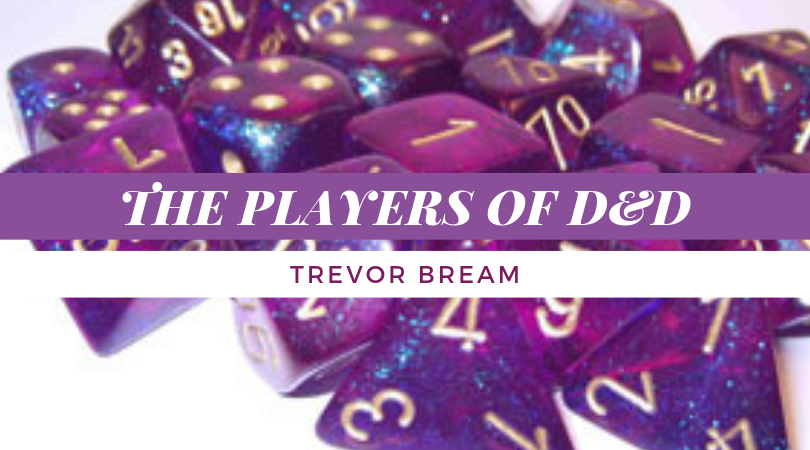
Rogues Portal (RP): What is your background or history with the game?
Trevor Bream (TB): I remember that it was my first semester in college and a couple of friends got together to play Pathfinder. I was drawn to it by how easy it was to get into character and tell a collective story with other people at the table. From there I have been playing various other role-playing games, but mostly 5e and as of last year, evening dipping into GMing. I don’t think I can stop at this point.
RP: What do you like about playing DnD?
TB: The thing that draws me in the most is how it provides a space for a group of people to tell a story, and how at least in terms of a long-form campaign that story can change over time. I think it is very interesting the way in which we can collectively tell stories as a group.
RP: How long have you been playing?
TB: I have been playing since 2013 and as of 2017 I started to GM as well.
RP: Favourite type of characters to play?
TB: So from the beginning I was almost always playing a ranger or rogue. I really liked how they could be very sneaky and reclusive, but I have since started to play a druid and other casters. I think I like them a lot more now being able to use magic can create some really interesting moments within play. I also like describing how my caster is using the different spell components to make the spell work.
RP: What are some challenges you face as a non-binary person playing DnD?
TB: Trying to be able to seek out inclusive spaces and resources can be a challenge. I think that D&D has started to become more inclusive, but there is still more work to be done.
RP: Were there any fears or hesitations or other things you might have had that stopped you from playing or kept you away?
TB: Some things for me was when I was just starting out there is a fear that I could not measure up to those who have been playing for years, and to be honest some of those players tend to lord it over other players. I think this can be a major barrier for many people and it can really ruin the experience of the game. I feel happy that I have a group that is very supportive and I want to share that with other players new and seasoned.
RP: What are some steps that need be taken to make it more inclusive?
TB: I think it is a matter of continuing the work of breaking down the barriers that prevent players from wanting to play. This is a simple answer to a more complex issue, but I think it comes down to the developers and the community working together to create content that is accessible to all types of players.
RP: You said that D&D has started to become more inclusive, in what ways has it done so already?
TB: I think that a good portion of folks have become very welcoming in the community, knowing that this is a game that is for everyone and wanting to foster a community that will continue to grow and many different kinds of gaming groups have been forming. I also think that to some extent that fact that we have sites like DM’s Guild that has content created by the community and fully recognized by Wizards is a good thing. This allows many different types of people to add to the collective canon that is D&D. The source material has also been written in a way that allows folks to easily pick up the game and start playing.
RP: You also said that to make it more inclusive, they need to continue breaking down barriers, which barriers have they broken down already and which ones do they still need to work on?
TB: Some of the barriers that I think they have broken down are that as a new player you can get access to the base rules for free and I think it was a good way to get more folks into D&D and allowed folks to just get right into creating a character and start playing. I also think that D&D has really come into the mainstream and with shows like Critical Role or High Rollers we have seen a shift where D&D is not viewed so much as something that nerdy kids do, but that everyone can do and have a good time.
The biggest barrier that I think the game still needs to work on is safety rules I will call them. I have seen them created and used by many different gaming groups, but I think it is important that the Devs would recognize and implement into written rules. What I mean by safety rules is a system that allows actions at the table to be reversed or stepped around if it becomes uncomfortable for someone.
An example of this would be what I am many of the folks I have gamed with call the X card. It is a card that has an X on it and it is placed on the table in reach of everyone. If at any point something that another player does makes anyone unconformable they can touch the card and the actions that just took place will be reversed and no questions will be asked. This allows the table to creatively move around what just happened and protects the player that was uncomfortable. It has been up to the individual groups to implement these kind of features in their games, but I think if the Devs would acknowledge these types of rules how much more power that would have and we could see rules like this used at more tables.
RP: What do you love about the game?
TB: Really it is being able to have so many different funny and serious moments and how we can come together to tell a story. Also rolling dice is a satisfying thing.
RP: What are some things you want people to know about the game?
TB: D&D is a great way to tell stories with friends and other people, and now is a great time to jump in and experience what D&D has to offer.
RP: How would you encourage people to get into the game or how to start playing?
TB: I would say find some friends that may be interested in playing and just play. See where is takes you and really create a space that is your own. You have a story to tell so tell it.
RP: Anything else you want to share?
TB: I just want to say thank you to all the people I have been able to play with and GM for and I hope I see you at the table.


![[REVIEW] TROJAN VOL. 1](https://geekd-out.com/wp-content/uploads/2023/06/IMG_2516-1-150x150.png)
